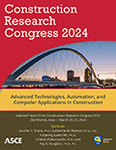Data-Driven Residence Energy Consumption Prediction Model Considering Water Use Data and Socio-Demographic Data
Publication: Construction Research Congress 2024
ABSTRACT
Data-driven energy prediction models can help urban planners and policymakers evaluate urban energy consumption patterns and then make informed decisions on how to improve urban energy efficiency. Typically, energy use data and building characteristics data were used to train these data-driven models. Few research utilized water use data and socio-demographic data, which have nexus with the energy consumption of buildings. This research utilized energy use data, building characteristics, socio-demographic, and water use data of multi-family buildings in New York City to train Least Absolute Shrinkage and Selection Operator (LASSO), Ridge Regression (RR), Support Vector Regression (SVR), and Random Forest Regression (RFR) machining learning models. The effects of socio-demographic and water use features on the performance of energy prediction were analyzed. Results showed that water use feature had significant positive impacts on the performance of LASSO, RR, and RFR models. Socio-demographic features had obvious positive impacts on the performance of SVR and RFR models. RFR trained with the BW dataset (including building characteristic features and water use feature) performed the best.
Get full access to this article
View all available purchase options and get full access to this chapter.
REFERENCES
Ali, U., Shamsi, M. H., Bohacek, M., Purcell, K., Hoare, C., Mangina, E., and O’Donnell, J. (2020). “A data-driven approach for multi-scale GIS-based building energy modeling for analysis, planning and support decision making.” Appl. Energy, 279, 115834.
Beal, C. D., Bertone, E., and Stewart, R. A. (2012). “Evaluating the energy and carbon reductions resulting from resource-efficient household stock.” Energy Build., 55, 422–432.
Bonczak, B., Blankinship, C., Chua, U., Stuart, I., and Kontokosta, C. E. (n.d.). “NYC Energy and Water performance Map.” <https://energy.cusp.nyu.edu/#/>. (Mar. 26, 2023).
Bourdeau, M., Qiang Zhai, X., Nefzaoui, E., Guo, X., and Chatellier, P. (2019). “Modeling and forecasting building energy consumption: A review of data-driven techniques.” Sustainable Cities Soc., 48, 101533.
Chen, Y., Guo, M., Chen, Z., Chen, Z., and Ji, Y. (2022). “Physical energy and data-driven models in building energy prediction: A review.” Energy Rep., 8, 2656–2671.
Cheng, C.-L. (2002). “Study of the inter-relationship between water use and energy conservation for a building.” Energy Build., 34(3), 261–266.
Deng, H., Fannon, D., and Eckelman, M. J. (2018). “Predictive modeling for US commercial building energy use: A comparison of existing statistical and machine learning algorithms using CBECS microdata.” Energy Build., 163, 34–43.
Gassar, A. A. A., and Cha, S. H. (2020). “Energy prediction techniques for large-scale buildings towards a sustainable built environment: A review.” Energy Build., 224, 110238.
Gassar, A. A. A., Yun, G. Y., and Kim, S. (2019). “Data-driven approach to prediction of residential energy consumption at urban scales in London.” Energy, 187, 115973.
Kontokosta, C. E., and Tull, C. (2017). “A data-driven predictive model of city-scale energy use in buildings.” Appl. energy, 197, 303–317.
Liu, H., Liang, J., Liu, Y., and Wu, H. (2023). “A Review of Data-Driven Building Energy Prediction.” Buildings, 13(2), 532.
Ma, J., and Cheng, J. C. (2016). “Estimation of the building energy use intensity in the urban scale by integrating GIS and big data technology.” Appl. Energy, 183, 182–192.
Mo, Y., Zhao, D., and Syal, M. (2019). “Effective features to predict residential energy consumption using machine learning.” Computing in Civil Engineering 2019: Smart Cities, Sustainability, and Resilience, American Society of Civil Engineers Reston, VA, 284–291.
NYCPlanning. (n.d.). “New York City Population FactFinder.” <https://popfactfinder.planning.nyc.gov/#15.83/40.832946/-73.871971>. (Mar. 26, 2023).
Robinson, C., Dilkina, B., Hubbs, J., Zhang, W., Guhathakurta, S., Brown, M. A., and Pendyala, R. M. (2017). “Machine learning approaches for estimating commercial building energy consumption.” Appl. Energy, 208, 889–904.
Wang, W., Hong, T., Xu, X., Chen, J., Liu, Z., and Xu, N. (2019). “Forecasting district-scale energy dynamics through integrating building network and long short-term memory learning algorithm.” Appl. Energy, 248, 217–230.
Wang, Z., and Srinivasan, R. S. (2017). “A review of artificial intelligence based building energy use prediction: Contrasting the capabilities of single and ensemble prediction models.” Renewable Sustainable Energy Rev., 75, 796–808.
Information & Authors
Information
Published In
History
Published online: Mar 18, 2024
ASCE Technical Topics:
- Buildings
- Business management
- Energy consumption
- Energy engineering
- Energy sources (by type)
- Hydro power
- Infrastructure
- Municipal water
- Practice and Profession
- Renewable energy
- Social factors
- Structural engineering
- Structures (by type)
- Urban and regional development
- Urban areas
- Water (by type)
- Water and water resources
- Water management
- Water supply
- Water use
Authors
Metrics & Citations
Metrics
Citations
Download citation
If you have the appropriate software installed, you can download article citation data to the citation manager of your choice. Simply select your manager software from the list below and click Download.
